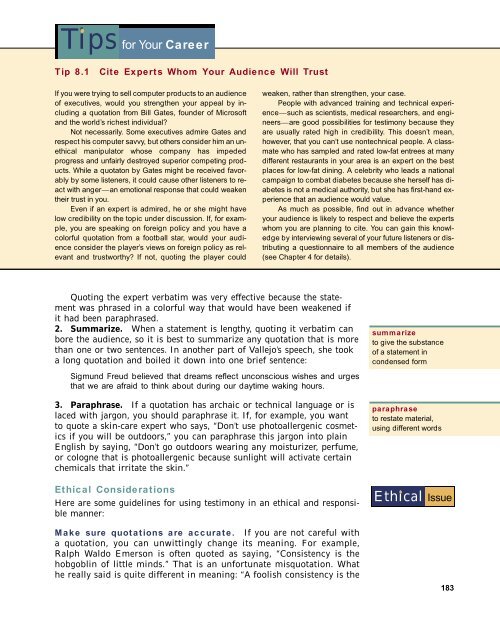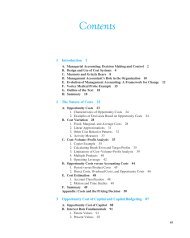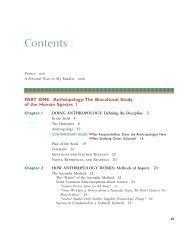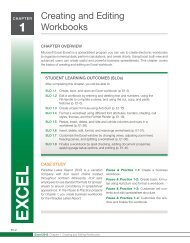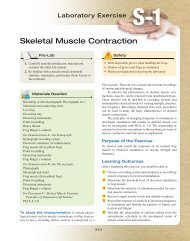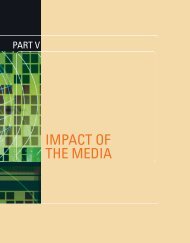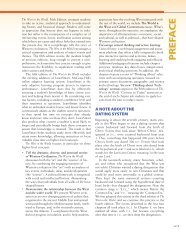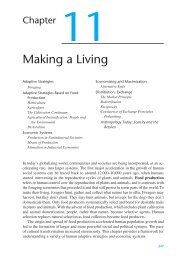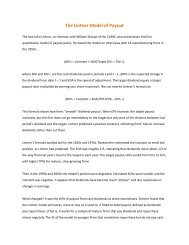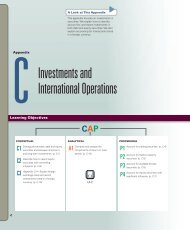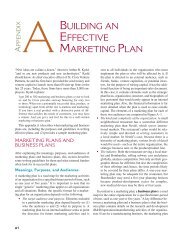Nurul Izzah Anwar, an engineering major at a college in Malaysia ...
Nurul Izzah Anwar, an engineering major at a college in Malaysia ...
Nurul Izzah Anwar, an engineering major at a college in Malaysia ...
You also want an ePaper? Increase the reach of your titles
YUMPU automatically turns print PDFs into web optimized ePapers that Google loves.
Tips for Your Career<br />
Tip 8.1 Cite Experts Whom Your Audience Will Trust summarize<br />
to give the subst<strong>an</strong>ce<br />
If you were try<strong>in</strong>g to sell computer products to <strong>an</strong> audience<br />
of executives, would you strengthen your appeal by <strong>in</strong>-<br />
weaken, r<strong>at</strong>her<br />
of a<br />
th<strong>an</strong><br />
st<strong>at</strong>ement<br />
strengthen,<br />
<strong>in</strong><br />
your case.<br />
People<br />
condensed<br />
with adv<strong>an</strong>ced<br />
form<br />
tra<strong>in</strong><strong>in</strong>g <strong>an</strong>d technical expericlud<strong>in</strong>g<br />
a quot<strong>at</strong>ion from Bill G<strong>at</strong>es, founder of Microsoft ence—such as scientists, medical researchers, <strong>an</strong>d engi-<br />
<strong>an</strong>d the world’s richest <strong>in</strong>dividual?<br />
neers—are good possibilities for testimony because they<br />
Not necessarily. Some executives admire G<strong>at</strong>es <strong>an</strong>d are usually r<strong>at</strong>ed high <strong>in</strong> credibility. This doesn’t me<strong>an</strong>,<br />
respect his computer savvy, but others consider him <strong>an</strong> un- however, th<strong>at</strong> paraphrase<br />
you c<strong>an</strong>’t use nontechnical people. A classethical<br />
m<strong>an</strong>ipul<strong>at</strong>or whose comp<strong>an</strong>y has impeded m<strong>at</strong>e who has to sampled rest<strong>at</strong>e m<strong>at</strong>erial, <strong>an</strong>d r<strong>at</strong>ed low-f<strong>at</strong> entrees <strong>at</strong> m<strong>an</strong>y<br />
progress <strong>an</strong>d unfairly destroyed superior compet<strong>in</strong>g prod- different restaur<strong>an</strong>ts us<strong>in</strong>g different <strong>in</strong> your words area is <strong>an</strong> expert on the best<br />
ucts. While a quot<strong>at</strong>on by G<strong>at</strong>es might be received favor- places for low-f<strong>at</strong> d<strong>in</strong><strong>in</strong>g. A celebrity who leads a n<strong>at</strong>ional<br />
ably by some listeners, it could cause other listeners to re- campaign to comb<strong>at</strong> diabetes because she herself has diact<br />
with <strong>an</strong>ger—<strong>an</strong> emotional response th<strong>at</strong> could weaken abetes is not a medical authority, but she has first-h<strong>an</strong>d ex-<br />
their trust <strong>in</strong> you.<br />
perience th<strong>at</strong> <strong>an</strong> audience would value.<br />
Even if <strong>an</strong> expert is admired, he or she might have As much as possible, f<strong>in</strong>d out <strong>in</strong> adv<strong>an</strong>ce whether<br />
low credibility on the topic under discussion. If, for exam- your audience is likely to respect <strong>an</strong>d believe the experts<br />
ple, you are speak<strong>in</strong>g on foreign policy <strong>an</strong>d you have a whom you are pl<strong>an</strong>n<strong>in</strong>g to cite. You c<strong>an</strong> ga<strong>in</strong> this knowl-<br />
colorful quot<strong>at</strong>ion from a football star, would your audiedge by <strong>in</strong>terview<strong>in</strong>g several of your future listeners or disence<br />
consider the player’s views on foreign policy as reltribut<strong>in</strong>g a questionnaire to all members of the audience<br />
ev<strong>an</strong>t <strong>an</strong>d trustworthy? If not, quot<strong>in</strong>g the player could (see Chapter 4 for details).<br />
Quot<strong>in</strong>g the expert verb<strong>at</strong>im was very effective because the st<strong>at</strong>ement<br />
was phrased <strong>in</strong> a colorful way th<strong>at</strong> would have been weakened if<br />
it had been paraphrased.<br />
2. Summarize. When a st<strong>at</strong>ement is lengthy, quot<strong>in</strong>g it verb<strong>at</strong>im c<strong>an</strong><br />
bore the audience, so it is best to summarize <strong>an</strong>y quot<strong>at</strong>ion th<strong>at</strong> is more<br />
th<strong>an</strong> one or two sentences. In <strong>an</strong>other part of Vallejo’s speech, she took<br />
a long quot<strong>at</strong>ion <strong>an</strong>d boiled it down <strong>in</strong>to one brief sentence:<br />
Sigmund Freud believed th<strong>at</strong> dreams reflect unconscious wishes <strong>an</strong>d urges<br />
th<strong>at</strong> we are afraid to th<strong>in</strong>k about dur<strong>in</strong>g our daytime wak<strong>in</strong>g hours.<br />
3. Paraphrase. If a quot<strong>at</strong>ion has archaic or technical l<strong>an</strong>guage or is<br />
laced with jargon, you should paraphrase it. If, for example, you w<strong>an</strong>t<br />
to quote a sk<strong>in</strong>-care expert who says, “Don’t use photoallergenic cosmetics<br />
if you will be outdoors,” you c<strong>an</strong> paraphrase this jargon <strong>in</strong>to pla<strong>in</strong><br />
English by say<strong>in</strong>g, “Don’t go outdoors wear<strong>in</strong>g <strong>an</strong>y moisturizer, perfume,<br />
or cologne th<strong>at</strong> is photoallergenic because sunlight will activ<strong>at</strong>e certa<strong>in</strong><br />
chemicals th<strong>at</strong> irrit<strong>at</strong>e the sk<strong>in</strong>.”<br />
Ethical Consider<strong>at</strong>ions<br />
Here are some guidel<strong>in</strong>es for us<strong>in</strong>g testimony <strong>in</strong> <strong>an</strong> ethical <strong>an</strong>d responsible<br />
m<strong>an</strong>ner:<br />
Make sure quot<strong>at</strong>ions are accur<strong>at</strong>e. If you are not careful with<br />
a quot<strong>at</strong>ion, you c<strong>an</strong> unwitt<strong>in</strong>gly ch<strong>an</strong>ge its me<strong>an</strong><strong>in</strong>g. For example,<br />
Ralph Waldo Emerson is often quoted as say<strong>in</strong>g, “Consistency is the<br />
hobgobl<strong>in</strong> of little m<strong>in</strong>ds.” Th<strong>at</strong> is <strong>an</strong> unfortun<strong>at</strong>e misquot<strong>at</strong>ion. Wh<strong>at</strong><br />
he really said is quite different <strong>in</strong> me<strong>an</strong><strong>in</strong>g: “A foolish consistency is the<br />
summarize<br />
to give the subst<strong>an</strong>ce<br />
of a st<strong>at</strong>ement <strong>in</strong><br />
condensed form<br />
paraphrase<br />
to rest<strong>at</strong>e m<strong>at</strong>erial,<br />
us<strong>in</strong>g different words<br />
Ethical Issue<br />
183


